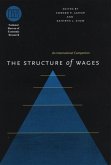Global patterns of economic development have hardly
changed over the past fifty years. All of the
countries that were rich then are still rich now,
and nearly all of the countries that were poor then
are still poor now. This volume such patterns
in the international structure of income over five
decades. The few examples of upward mobility in the
world-economy are examined in detail, with a special
section devoted to the recent rise of China.
Statistical estimates and graphs of global income
inequality at both the national and individual
levels of analysis are included. A key innovation of
this volume is the formulation of hybrid models of
economic growth combining elements from world-
systems theory in sociology and neoclassical growth
theory in economics. These models show that while
investment is correlated with growth in the core of
the world-economy, demographic effects predominate
in the peripheries. Moreover, investment,
particularly foreign direct investment, is shown to
follow rather than cause economic growth.
The overall message is that growth and development
are largely driven not by economic policy, but by
social policy.
changed over the past fifty years. All of the
countries that were rich then are still rich now,
and nearly all of the countries that were poor then
are still poor now. This volume such patterns
in the international structure of income over five
decades. The few examples of upward mobility in the
world-economy are examined in detail, with a special
section devoted to the recent rise of China.
Statistical estimates and graphs of global income
inequality at both the national and individual
levels of analysis are included. A key innovation of
this volume is the formulation of hybrid models of
economic growth combining elements from world-
systems theory in sociology and neoclassical growth
theory in economics. These models show that while
investment is correlated with growth in the core of
the world-economy, demographic effects predominate
in the peripheries. Moreover, investment,
particularly foreign direct investment, is shown to
follow rather than cause economic growth.
The overall message is that growth and development
are largely driven not by economic policy, but by
social policy.








